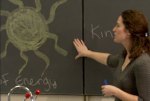The New York State Energy Research and Development Authority has created four new free workshops for teachers to help integrate energy education into their lesson plans and create energy smart students. These workshops are for K-12 Teachers, educators in not-for-profit agencies, pre-service educators, college professors, and other educational professionals. These workshops have been specialized base on grade level. The ABCs of Energy is aimed at grades K-3 and is a hands-on workshop that lays the groundwork for energy education. The 4 Es of Energy for grades 4-6 uses hands on activities to explore energy forms and sources. Focus on Solar is a workshop is specialized for 5-8 or 9-12 and teachers solar energy applications. Energy trilogy for grades 7-12 explores how economics, efficiency and environment relate to the energy challenges before us.
These workshops will be held in the finger lakes region. The first, Energy Trilogy, will be held on Jan. 28, 2010 at Genesee County Community College and again on April 28 at Monroe 2 BOCES. Monroe 2 BOCES will also host Focus on Solar for both grade levels on April 29, the ABCs of Energy and the 4 Es of Energy on April 30. More information about these workshops including location and registration information can be found Here at the NYSERDA website. The Workshop Flyer also gives a more in-depth look at the four workshops.




 Posted by Sara
Posted by Sara 
